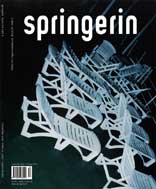Issue 4/2001
»Is it possible to create a 'location' in which the new self-employed find some of their needs for identity and culture, communication and mutual support, to have been met; where they can express their vision of a 'polis', and start to project a city on the scale of their needs and desires?« Sergio Bologna, the great Milanese analyst of the present change taking place in life and work in post-Fordian Western Europe, raises this question in a utopian plan, co-authored by him, that proposes a radical new conception for the living space of this class, and is published for the first time in this springerin issue. Bologna closes with the appeal: »When all dimensions of political action are too small – and this is the case with the new forms of work – only the dimension of a utopia can be realistic.« At present, many reversions to utopian c... » read more

Net section
Relevance and Unconscious Content
The project series »Shrink to Fit« organized by the Basel art server Xcult
Yvonne Volkart
Usual Suspects
The Boom of Paranoid Media Perception – a Critical/Subjective Examination
Thomas Edlinger
New Action Potentials – News from the Networld
Spreading Information on Mailing Lists and Web Sites after September 11 2001
Vera Tollmann
Net Strategies and the Future Tense of the New Economy
The »Copy Left« Event at the Viper Festival in Basle
Villö Huszai
Doom, Digital-Style
The catastrophic in the popular imagination as seen at this year's »RESFEST – Festival of Digital Film«
Christian Höller
Productive Unclarities
An interview with media artist Barbara Lattanzi
Keiko Sei
No Past? No!
An Interview with the Italian Analyst of Post-Fordism, Sergio Bologna
Klaus Ronneberger / Georg Schöllhammer
Fictive Class Consciousness
Comments on Recent French Cinema
Roger M. Buergel
History Collapsed
Or: A Passageway from Archeology to Physics
Jason Simon
Terror Weather
An interview with Bill Ayers on the history of militant opposition in the USA, »Weather Underground,« and the changed political situation following September 11, 2001.
Christian Höller
Rumor Clinics
False information, viruses, rumors and other syndromes in communicative processes, and early American methods of prevention and cure
Andrea van der Straeten
Potlatch Digital
A Perspective on the Future Economy of Music
Jacques Attali
Music in Virtual Space
David Toop
The City as Protagonist
The video "Driftwood" by the two London artists Nick Relph and Oliver Payne
Martin Beck
From a trauma to the Trauma
On the works of the two Bosnian artists Alma Suljevic and Jasmila Zbanic
Nebojsa Jovanovic
Out of Service
Three Exhibitions of Contemporary Art in Budapest
Andreas Fogarasi
Russia at the End of 2001
An update on contemporary arts and politics
Herwig G. Höller
Faces of Truth
The Ayloul Festival in Beirut in September 2001
Tania Förster
Artscribe
Recycle Bin
Suzana Milevska
Jochen Becker: Urban Control - Belfast von »hier« aus
Reinhard Braun
Werner Kaligofsky
Karin Jaschke
CTRL [Space] – Rhetorik der Überwachung von Bentham bis Big Brother
Gregor Jansen
Timewave Zero / The Politics of Ecstasy
Jan Verwoert
7. Internationales Festival für Gegenwartskunst: Stadt der Frauen
Marina Grzinic
make-world
Nicolas Siepen
Six Degrees of Separation
Christa Benzer
Vera Frenkel: Body Missing
Hedwig Saxenhuber
Florian Pumhösl
Matthias Dusini
Sturm der Ruhe – What is Architecture?
Matthias Dusini
Televisions – Kunst sieht fern
Sønke Gau
20 Jahre Galerie erweiterter Medien. To Tell a Story
Sandra Krizic Roban
Belonging – Sehnsucht und Zugehörigkeit
Edith Krebs
Welcome to the Revolution
Oliver Marchart
Books
Christian Kravagna, Kunsthaus Bregenz (Hg.):
Das Museum als Arena
Justin Hoffmann
Lev Manovich:
The Language of New Media
Heiko Idensen
Paul Virilio:
Die Kunst des Schreckens
Martin Reiterer
Doris Guth, Elisabeth von Samsonow (Hg.):
SexPolitik
Hemma Schmutz
Ute Meta Bauer & Institut für Gegenwartskunst (Hg.):
Education, Information, Entertainment - Aktuelle Ansätze künstlerischer Hochschulbildung
Marion von Osten